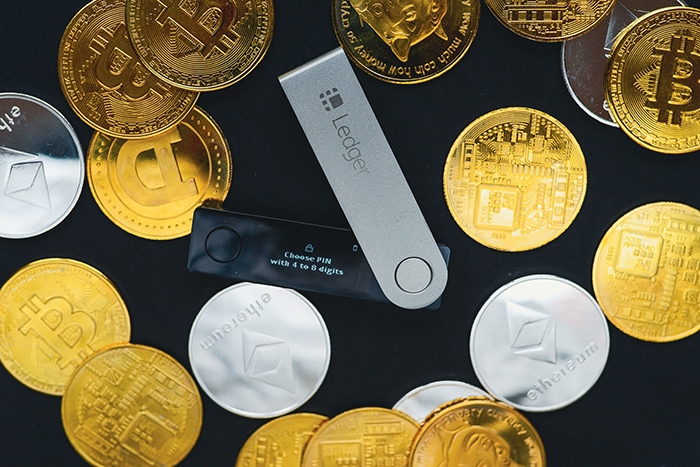Wherever it’s possible to make money, there are going to be scammers. Speaking of, can we offer you an extended warranty for your car? Cryptocurrency is no different. Even if you manage to not transfer your funds into the ether, there are plenty of avenues for nefarious types to take advantage of those new to the space.
What makes cryptocurrency so attractive is the myth that cryptocurrency is untraceable. But, that’s hardly the case… in case you were thinking of ways to avoid reporting it on your taxes this year.
Cryptocurrency isn’t as scary as it might sound from everything we just wrote, but from phishing scams to rug pulls, here are five cryptocurrency scams to watch out for. And, if you are new to it, take a moment and read our beginner’s guide.
As always, this isn’t investment advice.
5 Cryptocurrency Scams to Watch Out For
1. The Social Media “Friend”
The friend scam can take many forms but it often begins with a follow or friend request on social media. Scammers may seem relatively normal at first, building trust, before they launch their scam.
According to Mashable, one of the most popular scams is impersonating big companies and convincing people to invest in fake cryptocurrencies. Maybe don’t get back to the CEO of Peepsi.
How to avoid this scam? Research the claims, look for websites that are not on social media, don’t click any links on social media and stick to legitimate cryptocurrency channels until you can verify information on the new coins.
2. The Rug Pull
The rug pull crypto scam can sometimes be hard to spot even for more experienced traders. This happens when a team launches a coin or NFT project, drives up the price, takes the profits, and runs away into oblivion.
According to The Verge, a NFT rug pull happened recently with Frosties, a series of icy avatars. “Ethan Nguyen and Andre Llacuna allegedly earned around $1.1 million by selling non-fungible tokens (or NFTs) based on cartoon-like characters called “Frosties.” After selling the NFTs, they shut down the project and transferred its funds to a series of separate crypto wallets, leaving Frosties owners bereft of promised rewards.” The U.S. government has charged the pair with fraud and money laundering. Tony the Tiger does not approve of this project.
This won’t always protect you, but look out for: a lack of background information on the founders, projects where the founders don’t go by their real names (yes, there are notable exclusions here), low liquidity, coins that are listed only on one DEX, and projects that seem a little overyhyped… even for crypto.
3. The Fake Giveaway
Giveaways are fun. Who doesn’t want to win free stuff? But giveaways are a great way for cryptocurrency scammers to get a list of willing victims.
Here’s how this works:
- The scammer sets up a fake social media account and maybe even pretends to be someone famous.
- The scammer shares expert-sounding advice on cryptocurrency to gain followers.
- The scammer hosts a Giveaway where they ask people to send them crypto in exchange for getting double or triple in return.
- The scammer keeps the victim’s coins.
According to CNBC, a victim forked over $1.1 million in Bitcoin in a similar crypto scam. While you can receive “free” crypto and NFTs from legitimate airdrops and faucets, if the deal looks to good to be true, it is.
4. Phishing Scams
The phishing scam has been around for a while, and now crypto scammers are using it too.
In a phishing scam, the victim gets an email from what looks to be a real company. But, it’s not. Inside, the email is a link to a fake account login. If the person clicks the link and uses their username and password on the fake site, the scammer gets the keys to their account. Crypto scammers are using this tactic to steal wallets.
But in crypto, the bad links aren’t just limited to emails. Don’t click links in emails. Don’t share your login or wallet seed phrase with anyone. And, avoid clicking links in Twitter, Telegram, Discord, or on other social platforms if you don’t personally know the person who posted it. And, even then… be careful.
5. The Crypto MLM
Multi-level marketing schemes have made their way into cryptocurrency. Recently, two siblings were caught by authorities after setting up a fake MLM that claimed to mine crypto coins. Instead, they stolee $124,000,000 from crypto investor hopefuls. And, you thought the essential oil people from high school were bad.
Research companies before investing. The SEC website is a one place to start to determine whether a company is legitimate. If a company isn’t there, read their whitepaper. Research their owners via LinkedIn and other sources. Do your due diligence. It’ll not only help you invest in good projects, it’ll hopefully protect you from crypto scammers as well.
- Don’t Fall For These Crypto Scams - March 29, 2022
- Are You Spending More Than You Think on Your Monthly Subscriptions? - January 27, 2022












Leave a Comment